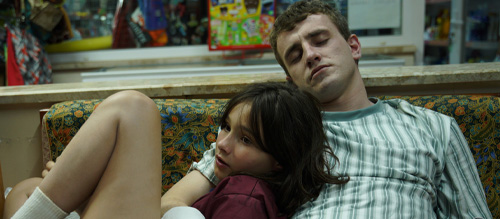
Aftersun (2022)
Director: Charlotte Wells
Screenwriter: Charlotte Wells
Starring: Paul Mescal, Frankie Corio, Celia Rowlson-Hall
Met with critical acclaim after first premiering during Cannes Critic Week, Charlotte Wells’ feature directorial debut opened the 2022 Edinburgh International Film Festival in its UK premiere. The feature, from the Scotland-born director, follows the father-daughter duo of Calum (Paul Mescal) and Sophie (Frankie Corio) as they holiday at a hotel resort in Turkey.
It is a very simple tale but one that Wells has brought to the big screen with the utmost delicacy, Aftersun playing out like a gentle hand on your shoulder, leading you carefully through each of its events. Edited as naturally as the blink of an eye, each new cut feels almost habitual. It is in the smaller details, the fine lines, however, that the film truly excels.
In many ways, Aftersun is very similar to that of Spike Lee’s Do the Right Thing, tensions bubbling underneath the surface just waiting for an outburst, a release. Whereas the racial tensions between Mookie and Sal of Do the Right Thing are shown more outwardly through frank racist dialogue, the tensions between Calum and Sophie are more internal.
Early in the film, a very Scottish father is seen carrying his kicking and screaming child, accusingly saying “you always have to ruin it for everyone.” Calum’s parenting could not be farther from this, nor could Sophie’s behaviour. Instead they remain happy in each other’s company, though there is a constant feeling that one of them could snap at the other any minute.
This tension between the duo is the backbone of the entire film and masterfully delivered by both Mescal and Corio, both of whom give fantastic performances. Similar to the natural editing of the film, Corio and Mescal are naturally believable as a father and daughter. Corio brings a youthful energy to the film that is as relatable as it is adorable, and she delivers her dialogue so well that you’d believe she had improvised every line. Mescal brings weight to the film, evoking a range of emotions to project the demons that Calum is fighting whilst trying his best to be a good father. The weight and energy that Mescal and Corio forge creates an initial opposition between the two.
There are numerous moments in which it seems as though one may be unhappy with the other; Calum watching from afar as Sophie plays in the arcade with a boy, Sophie refusing to let her father put suntan lotion on her. In letting the tension remain, just waiting to explode, Wells expertly creates an unease that leaves you squirming in your seat, cringing at every awkward interaction, expecting something horrible to happen any minute now. It is this constant bait and switch that ensures Aftersun is so engaging.
The clear differences between the characters add new layers to the tensions that build between the two throughout, yet there is never a doubt that they love each other. Their bond, as emphasised through both through writing and performance, is palpable – it is clear that Calum is a great father and wants to be the best parent his kid can have, but his struggles with his own demons make it difficult. Equally so, it is clear that Sophie really appreciates everything her father does and loves him.
In among the love and tension that Wells has created there is an excellent portrayal of family, a feeling of unwavering love no matter what happens. It is perhaps one of the greatest portrayals of a parent-daughter relationship put to screen. In a year where Everything Everywhere All at Once is heralded for its complexity, Aftersun deserves to be lauded with the same level of enthusiasm for its simplicity. Charlotte Wells’ directorial debut is a truly wonderful picture.
Score: 24/24

